In the ever-expanding universe of podcasting, where creators vie for listeners' attention and loyalty, organization is not just a virtue - it's a necessity.
Enter the podcast planning template: your backstage pass to a smoother, more professional production process. But what is this tool, and why has it become an indispensable asset for podcasters?
This article will cover it all - from commonly asked questions to what you should include in your podcast planning template, to some of the best free and paid templates available on the market.
Ready to learn how to create your podcast planning template? Let’s go.

Book Your Next Podcast Guest the Easy Way
With more than 70,000 members, MatchMaker.fm is the largest online community connecting podcasters & guests.
Join MatchMaker todayIt's free to join!
What Is a Podcast Planning Template?
A podcast planning template is a comprehensive blueprint for your show. It organizes every phase of your podcast creation process - from the spark of an idea to the moment your content hits the airwaves (and even afterward).
It typically includes various sections to help creators brainstorm, outline, and execute their podcast episodes seamlessly. This template is not a one-size-fits-all solution. Instead, it's a customizable framework that adapts to your podcast's unique needs and goals.
Do You Need a Podcast Planning Template?
It’s not a hard and fast rule that you need a podcast planning template to produce good episodes of your show. Having one does help, though. Why? Well, the answer lies in its ability to streamline production, maintain consistency, enhance quality, and facilitate collaboration.
A well-structured podcast planning template simplifies the process of bringing an episode from concept to completion. It helps ensure that your show remains consistent in quality and on schedule, which is crucial for retaining listeners and building a loyal audience. Moreover, a planning template for podcasts produced by multiple team members also serves as a vital communication tool, keeping everyone aligned on tasks and deadlines.
In a landscape where content is king and competition is fierce, a podcast planning template is not just a tool - it's a strategic asset. By embracing this organized approach, you can focus more on creativity and engagement, knowing that the logistical backbone of your podcast is solidly in place.
7 Things to Include in Your Podcast Planning Template
A well-thought-out planning template is your best ally. Think of it as the most versatile tool in your podcasting toolkit, which you can customize extensively or selectively, depending on your show's demands and workflow.
You might integrate every component below for a full-scale approach, or focus on a few key elements. The beauty of a podcast planning template lies in its adaptability - so don’t be afraid to test different configurations to discover what best enhances your podcast production process.
Ultimately, the goal is to create a podcast template that feels tailor-made for your show, streamlining your efforts and elevating your content. Here are 7 things to factor in.
1. Your Podcast Series Overview
The foundation of any successful podcast begins with a solid series overview. This component is your north star, guiding every decision about your podcast.
It starts with your mission statement, articulating your show's core purpose and value proposition. Who are you speaking to, and what unique perspectives or insights do you offer? Identifying your target audience is crucial here, as it influences everything from the tone of your episodes to the topics you choose to cover.
Your series overview also outlines the format and structure of your podcast. Will you engage listeners with interviews, storytelling, educational content, or a mix? This planning stage includes deciding on the length of episodes and how frequently you'll release new content.
These decisions collectively shape the listener's experience, setting expectations for what they can anticipate from your podcast.
2. Episode Planning
A well-thought-out episode plan is at the core of every memorable podcast, transitioning a podcast idea into a fully structured episode. The podcast episode plan is foundational in crafting a podcast episode that resonates with your audience and delivers on your podcast's promise.
What can you include in your episode planning template? Here are a couple of suggestions:
- Topic Selection: Outline a method for choosing topics based on audience interest and relevance to your podcast's theme. This ensures content resonates and engages listeners.
- Research Notes: Prepare a space where you can jot down key insights and data gathered on the episode topic.
- Guest Details: For interview episodes, include placeholders for guest bios, contact information, and interview questions to facilitate guest management and episode preparation.
- Episode Outline: Detail the episode's structure, including introductions, main segments, and conclusions to guide narrative flow and segment focus.
This streamlined approach lays out the essential steps for preparing each new episode and setting a solid foundation for subsequent production stages. It's designed to ensure your episodes are engaging for your audience and strategically aligned with your podcast's goals.
3. A Pre-Production Checklist
The pre-production checklist of a podcast planning template focuses on ensuring all preparatory steps are completed before recording begins. This includes finalizing the episode's content and structure, ensuring any guests are briefed and scheduled, checking that all recording equipment is operational, and setting up a quiet, controlled environment for recording.
This checklist is crucial for streamlining the production process, minimizing potential issues during recording, and ensuring the quality of the podcast episode.
4. Production Notes
Production notes guide the recording and editing process, emphasizing techniques for maintaining audio consistency, managing background noise, and engaging delivery. It outlines editing strategies for refining the episode, consistently integrating branding elements like intro and outro music, and conducting final quality checks.
This section of the template ensures that each episode meets the podcast's audio quality and listener engagement standards, maintaining the professional and polished feel of the podcast series.
5. Details of Your Post-Production Workflow
The post-production workflow section of a podcast planning template covers all the steps necessary after recording to prepare an episode for release. This process involves detailed editing to ensure audio clarity and coherence, integrating sound effects or music, and finalizing the audio with mastering to achieve the desired sound quality.
Creating show notes, a podcast calendar template, transcriptions, and episode summaries for accessibility and SEO purposes are crucial. This stage solidifies the episode's readiness for publishing, ensuring it's polished and professional while providing a seamless listening experience.
6. Your Distribution & Promotion Plan
In the distribution and promotion plan, the template focuses on strategies for making your episode available to the broadest possible audience and creating buzz around it.
This involves selecting distribution platforms, scheduling the episode's release for optimal listener engagement, and leveraging social media, email newsletters, and podcast directories for promotion.
7. Any Relevant Metrics & Feedback
The metrics and feedback section is where the effectiveness of the podcast is evaluated. This part of the template guides and allows you to track key performance indicators (KPIs) such as download numbers, listener engagement rates, and social media metrics to gauge the podcast's reach and impact.
This continuous loop of measurement and response is vital for the podcast's growth and evolution, ensuring content remains relevant and resonant with the audience.
How to Measure Podcast Success: The 12 Key Metrics to Use
4 Things to Consider Before Starting a Planning Template
Now you know what a podcast planning template should include, it’s time to look at some of the key things to consider before you get stuck into building one.
1. Assess Your Needs
Begin by identifying what aspects of your podcast need organizing. Are you looking to streamline episode planning, guest management, production schedules, or promotional activities? Understanding your specific needs helps to tailor the planner as a comprehensive tool for your podcasting journey.
2. Determine Granularity
Next, decide on the level of detail you want your planner to have. Some podcasters prefer a high-level checklist that covers the basics, whilst others may need a detailed template that guides them through each process step - from conceptualization to publication.
This choice depends on how much control and oversight you desire over the podcasting process.
3. Understand Your Team’s Involvement
Considering who will be part of the podcast production process is essential. A simpler template might suffice for solo podcasters, focusing on personal organization and workflow management.
However, a more detailed and collaborative planner is necessary if you work with a team. This should include roles and responsibilities for each team member - such as scriptwriting, hosting, editing, and social media management.
A comprehensive template ensures everyone is aligned and informed about their tasks and deadlines, facilitating better coordination and efficiency. Tools that support real-time collaboration and updates, like project management software, can be handy in this context.
4. Choose Your Tool
Once you have a clear idea of your needs and the desired level of detail, the next step is to select an appropriate tool for creating your template. Microsoft Word or Google Docs are great for straightforward, text-based templates.
However, if you want more functionality, such as calendar integration or task assignments, you might explore free or paid project management tools like Trello, Asana, or Airtable. These platforms offer customizable templates that can be adapted for podcast planning, allowing for a more dynamic and interactive planning experience.
7 Podcast Planning Templates To Try
Below are 7 ready-to-go podcast planning templates. Have a look through them and decide which one best suits your wants and needs.
1. Podcast Episode Plan, by Milanote
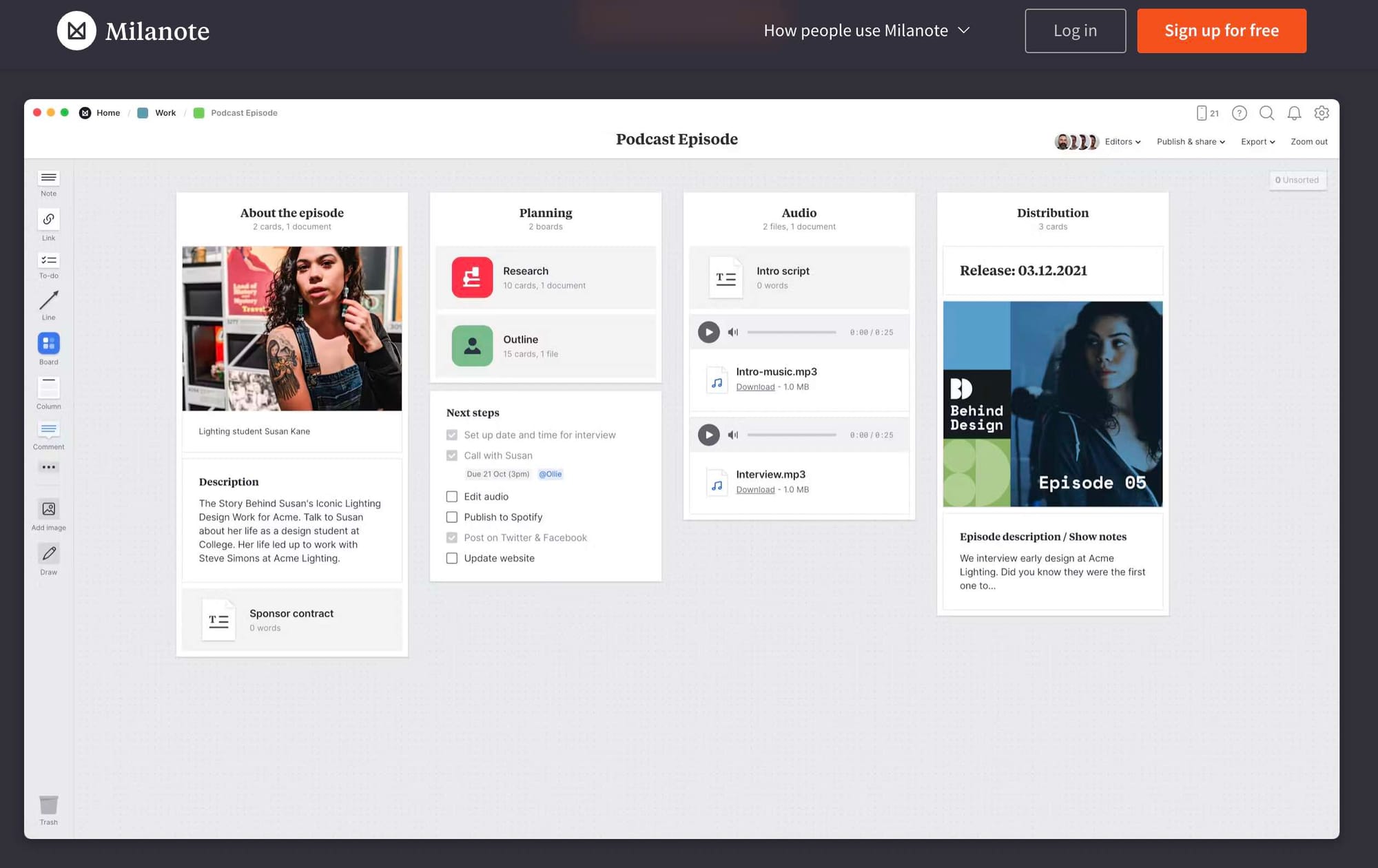
The Milanote “Podcast Episode Template” is designed to streamline the podcast creation process - consolidating ideas, plans, and research in a single, accessible location. It's the ideal tool for those looking to deeply explore their episode concepts, and offers features for brainstorming, collecting inspiration (video included), and detailed topic research.
Users can create comprehensive podcast outlines or scripts, map out key talking points, and organize their production workflow efficiently in one place. The podcast outline template also supports collaboration, allowing team members to comment and contribute, making producing engaging and well-structured podcast content easier. This organized approach ensures a more efficient production process and a confident start to recording.
2. Podcast Calendar, by ClickUp
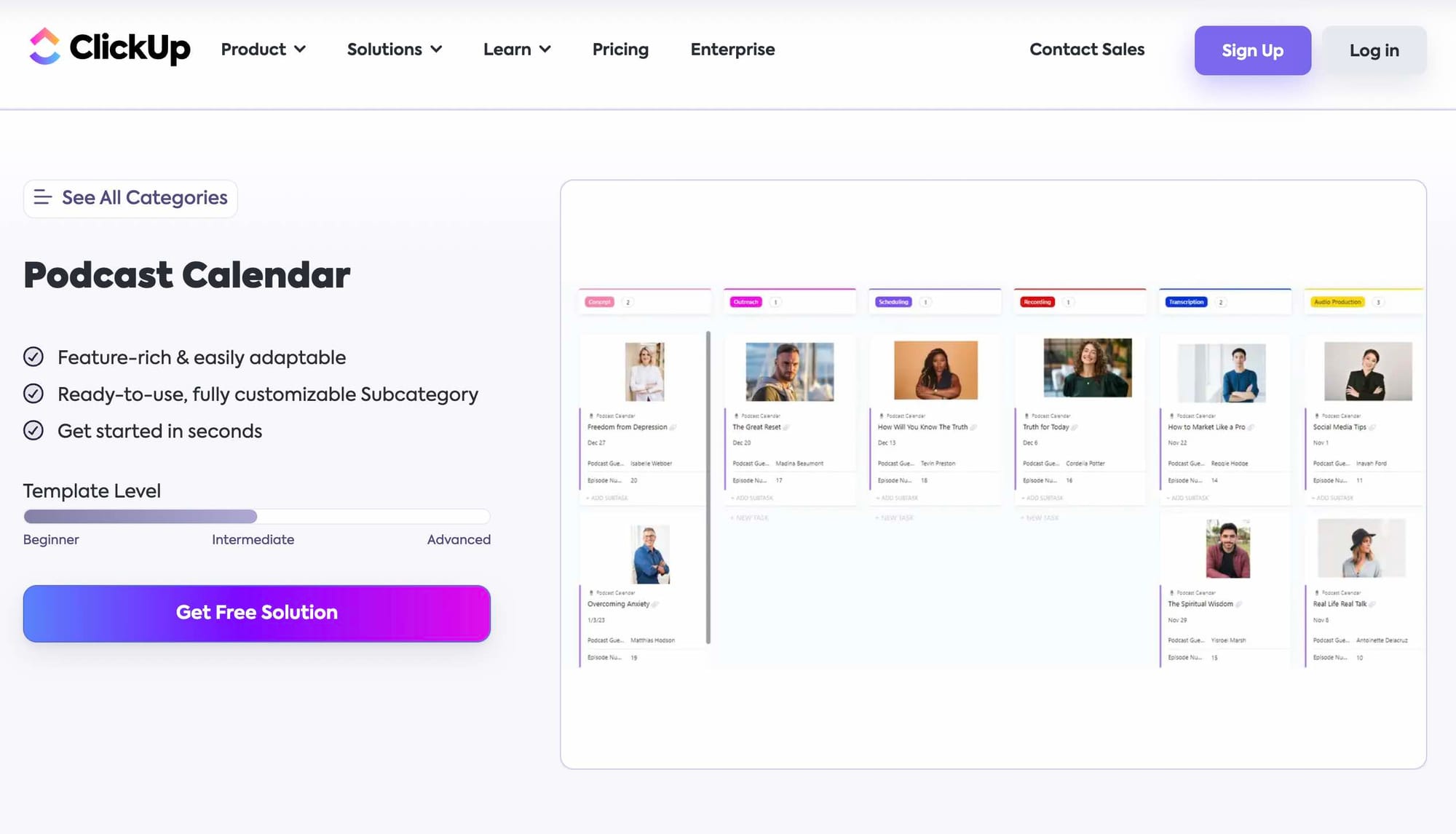
This ClickUp “Podcast Calendar Template” is feature-rich and easily adaptable. It helps podcasters manage their episodes - from planning podcast scripts well in advance to tracking guest appearances.
It features 18 custom fields such as Sponsor, Budget, Guest Headshot, Podcast Title, Episode Link, and Season, with color-coded tags to indicate each episode's development stage (like Concept, Outreach, Scheduling, Recording, or Transcription).
But that is just one of the many ClickUp templates available for podcasters. If you want to go super granular, this one lets you plan out every step of the podcast planning journey.
ClickUp is a project management tool known for its flexibility and wide range of free templates, including those specifically designed for podcasters. These templates are perfect for beginners, offering ready-to-use, fully customizable options that can be set up in seconds.
3. Podcast Planning, by Monday.com
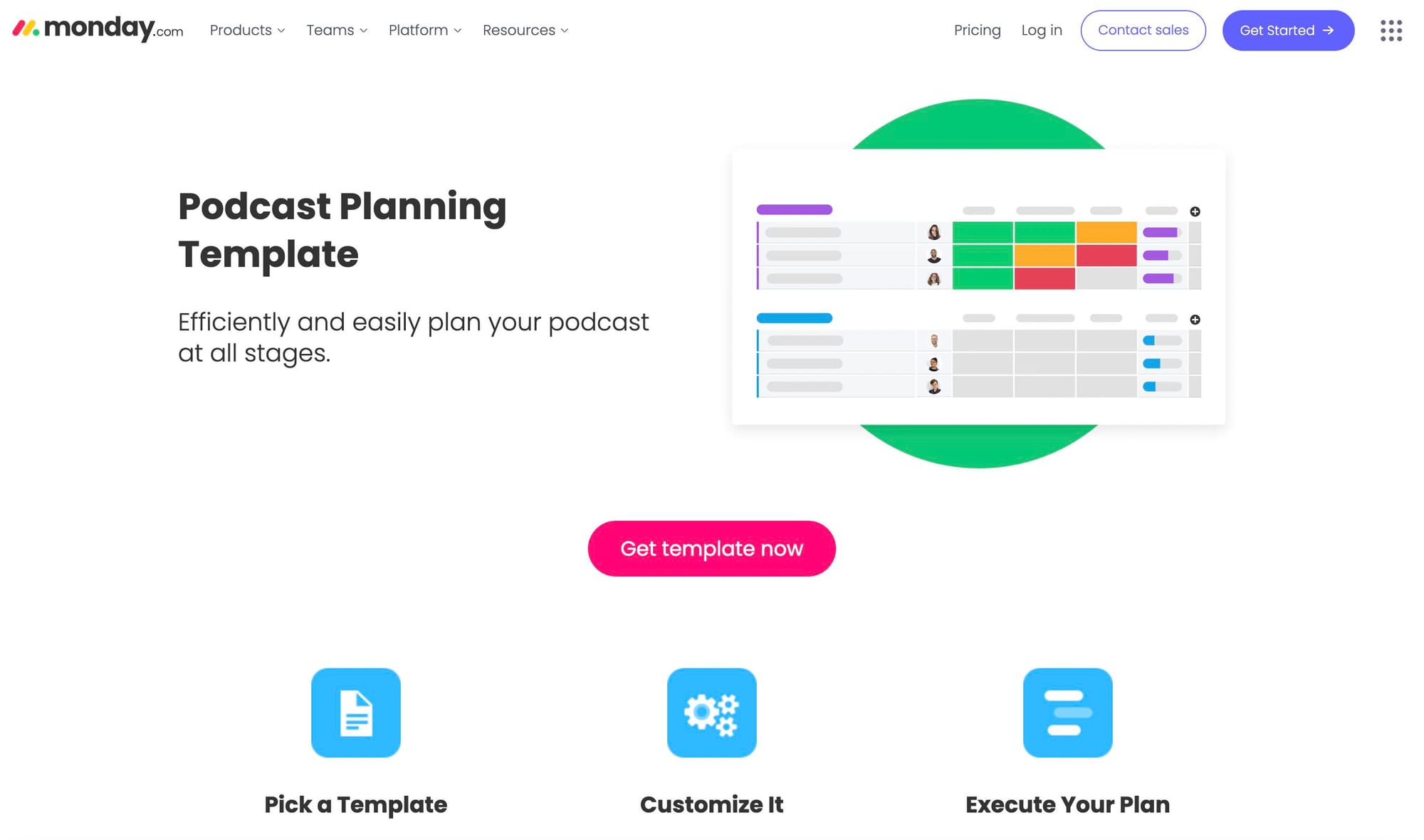
Monday.com is a versatile project management platform with a dedicated podcast planning template. This template is designed to streamline the entire podcasting process - from initial brainstorming to publication.
Users can select the pre-made template and customize it to fit their needs, making it an ideal tool for novice and experienced podcasters. The main table view offers a comprehensive overview of your podcasting process, allowing for easy tracking and management of each episode's progress. By clicking on an individual line, you can upload files, link documents, and make notes.
Monday.com offers free and paid versions, catering to various budgets and project sizes.
4. Episode Script, by Milanote
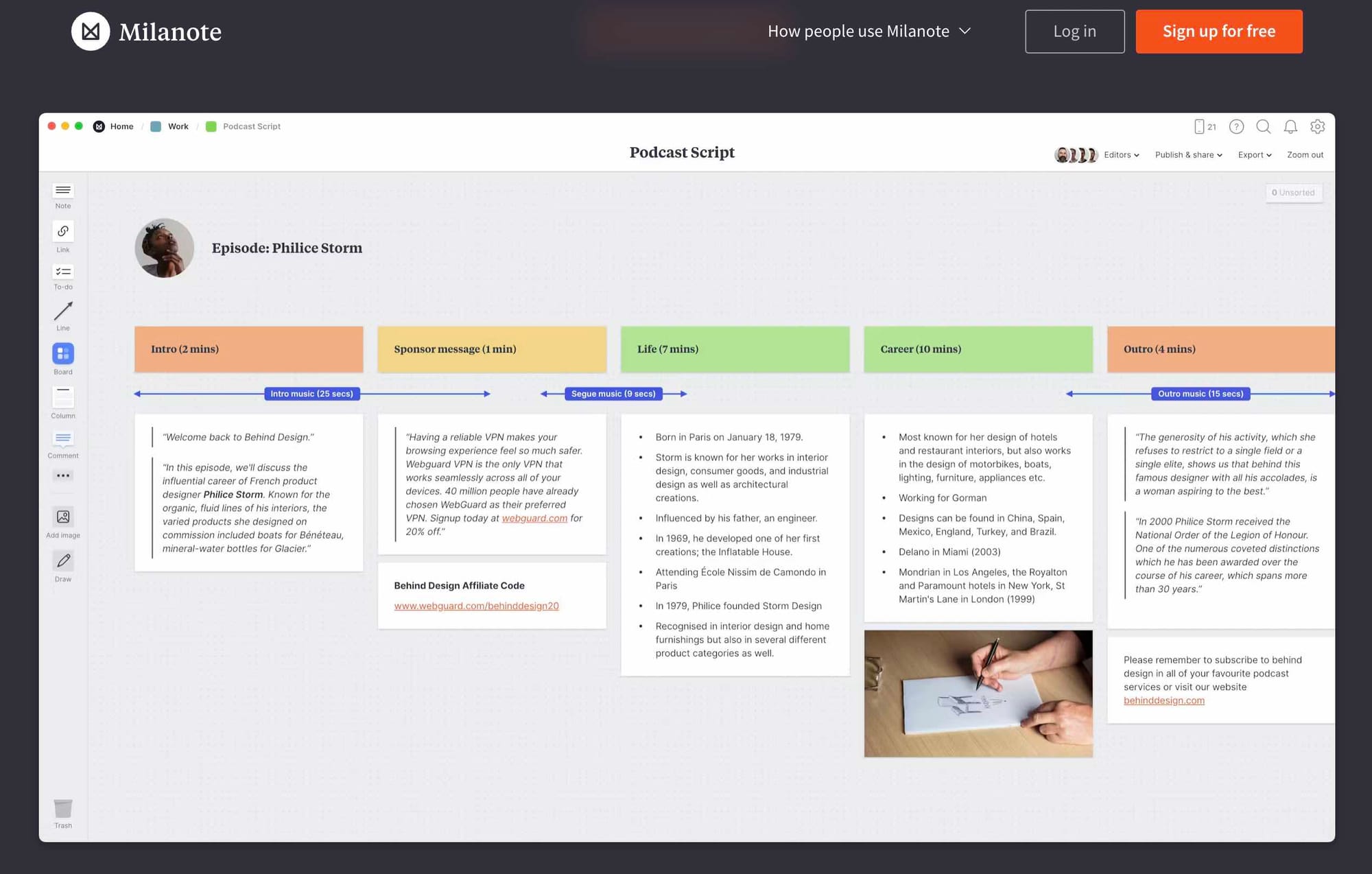
The Milanote “Podcast Episode Script Template” is tailored for podcasters to outline their episodes, gathering all necessary components in one visually organized platform. It emphasizes script mapping, and a standout feature is the ease of collaboration it offers, allowing teams to refine the script and contribute resources jointly.
Perhaps the standout feature of Milanote’s templates is its integration within the broader Milanote planning environment. Users can link this script template with other templates or sections related to their podcast project. This interconnectedness ensures a fluid workflow.
5. Podcast Production Schedule, by Notion
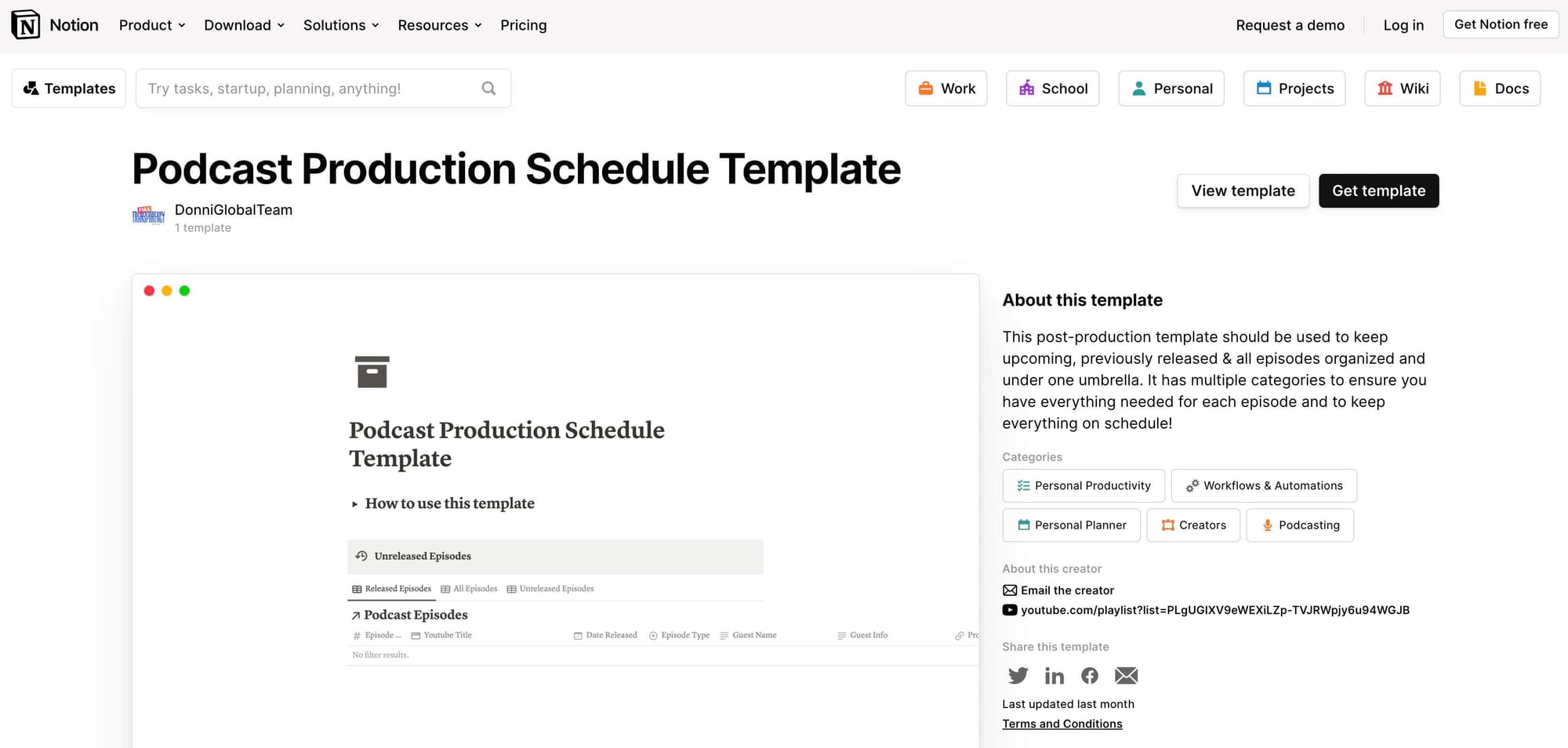
Notion is a comprehensive organization tool that blends notes, tasks, databases, and calendars into one versatile platform. Their “Podcast Production Schedule Template” is designed to centralize the management of upcoming and previously released podcast episodes under a single umbrella.
This template features multiple categories to ensure thorough preparation for each episode - helping podcasters stay on track with their production timeline and maintain an organized overview of all episode-related tasks and materials.
6. Podcast Workflow, by Trello
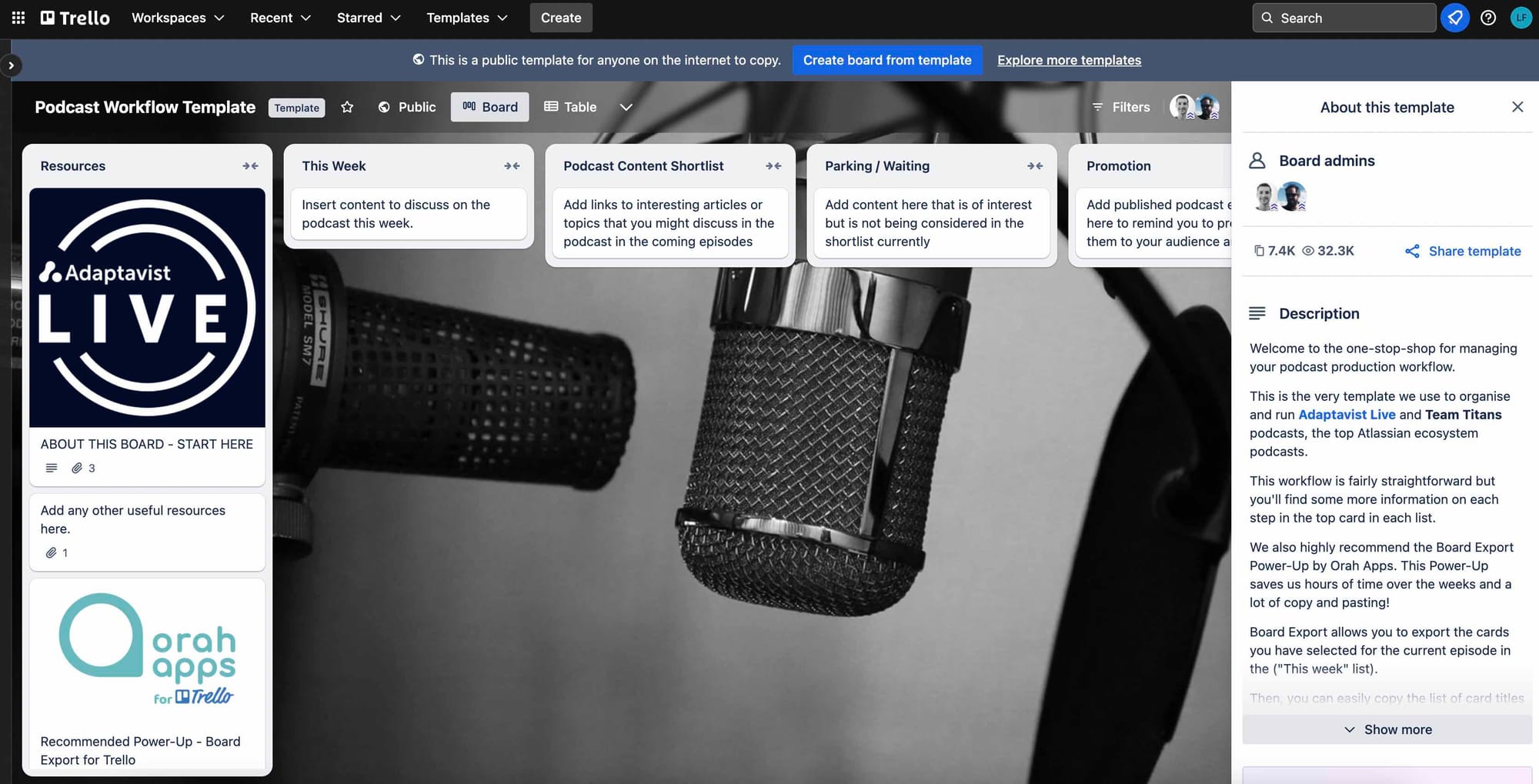
Trello is a visual project management tool that facilitates the organization of projects into boards, lists, and cards. The “Podcast Workflow Template” is the actual template used to manage and run the Adaptavist Live and Team Titan podcasts, among the top podcasts in the Atlassian ecosystem.
This template is a one-stop shop for managing your podcast production workflow, organizing everything from episode planning to publication in a clear, manageable format.
7. Podcast Editorial Calendar, by Airtable
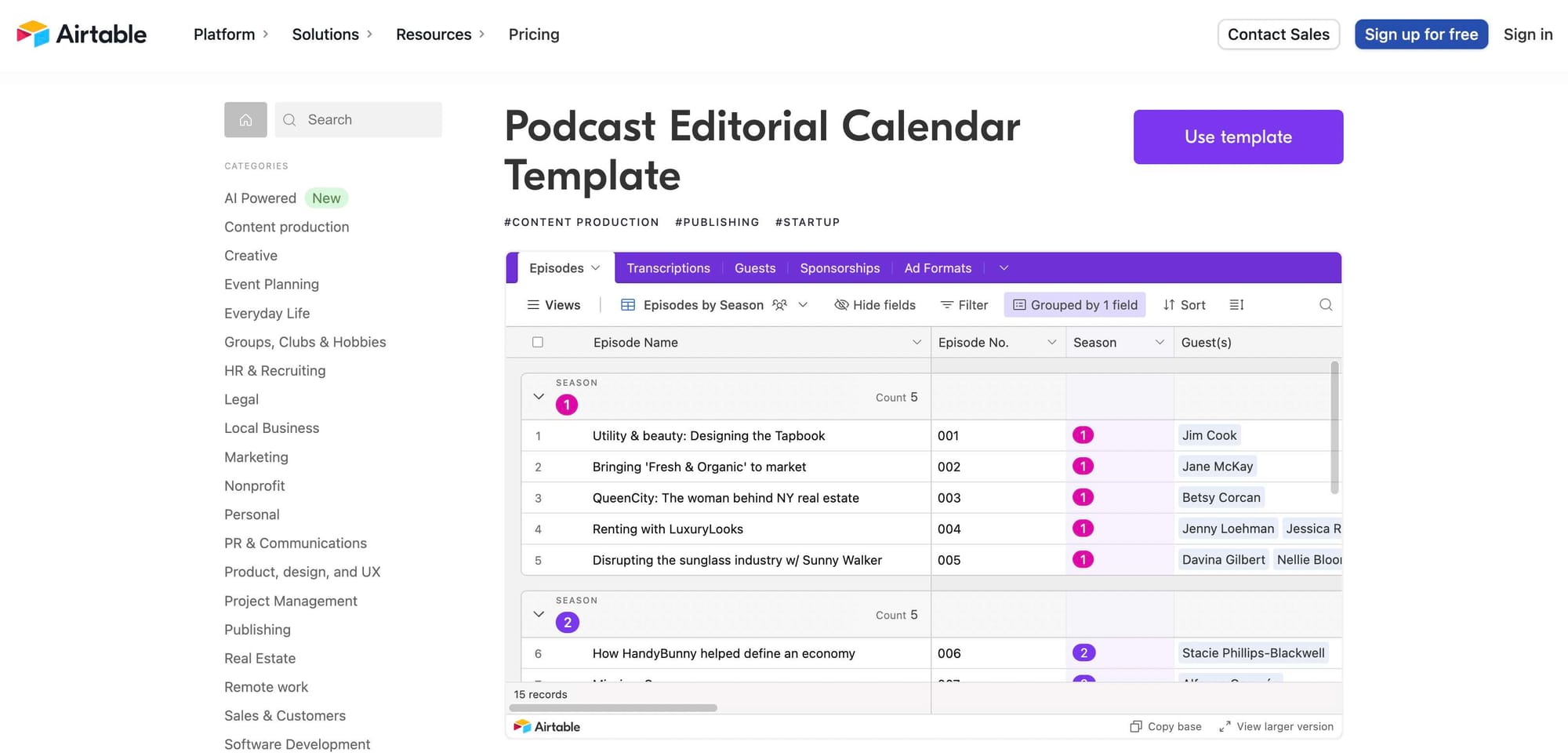
Airtable combines a spreadsheet's simplicity with a database's complexity, making it an ideal project planning and management tool. The “Podcast Editorial Calendar Template”, inspired by the fictional Innovator Diaries podcast, offers a streamlined approach to managing the podcast production process.
It covers everything from scheduling upcoming guests and topics to overseeing transcription and sponsorship processes, ensuring a smooth workflow from concept to completion for each episode.
How to Use a Podcast Planning Template
A podcast planning template can significantly streamline your production process and ensure episode consistency. Here are 3 tips on how to effectively use one:
1. Customize It to Fit Your Needs
While templates provide a solid foundation, tailoring them to your podcast's requirements is crucial. Adjust sections, add new elements, or remove irrelevant parts to match your workflow and content style. This customization makes the template more relevant and valuable for your podcast's unique structure and goals.
2. Collaborate & Share
Leverage the collaborative features of your chosen platform to share the template with your production team. Real-time editing, commenting, and task assignment functionalities can improve communication and ensure everyone involved in the podcast production is aligned. Assign sections to specific team members, such as scriptwriting to one person and social media promotion to another, to streamline responsibilities and enhance productivity.
3. Regularly Review & Update Your Template
As your podcast evolves, so should your template. Make it a habit to regularly review and update your template to reflect any changes in your podcast's direction, audience feedback, or new goals. Regular updates ensure your template remains a valuable and effective tool for your podcasting workflow, facilitating growth and adaptation over time.
Ready to Create a Podcast Planning Template?
Harnessing the power of podcast templates can transform the podcasting process, making it more streamlined, organized, and efficient.
Whether it's a podcast schedule template to keep track of your publishing calendar, a podcast planning worksheet for brainstorming and structuring your episodes, or a podcast show notes template for crafting compelling summaries for your listeners, these tools are indispensable.
They not only save time and reduce stress but also enhance the overall quality of your podcast, allowing you to focus on creating content your audience loves. By embracing these resources, podcasters can elevate their production process and deliver engaging, professional-quality podcasts that stand out in a crowded market.

The #1 Podcasting Community
With more than 70,000 members, MatchMaker.fm is the largest online community connecting podcasters & guests.
Join MatchMaker todayIt's free to join!






